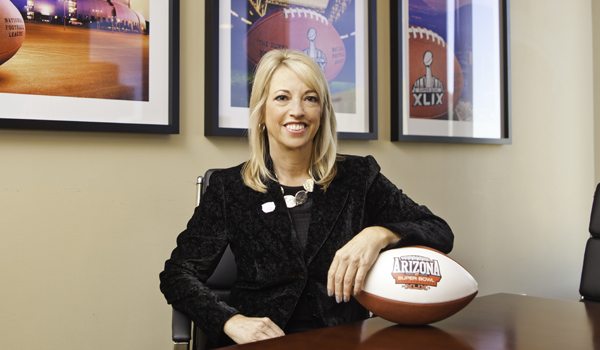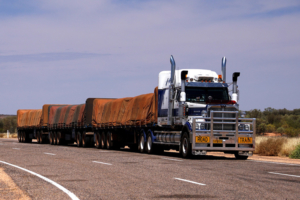Early in the planning process for the 2015 Super Bowl, Arizona Super Bowl Host Committee CEO Jay Parry was giving a presentation to Greater Phoenix Leadership and she referred to some of national perceptions of Arizona as “misperceptions.”
“An individual walked up to me after the presentation and said, ‘You did a great job, but just one point of clarification,’” Parry recounts. “‘Those are not misperceptions, those are reality.’ That was a good point. Some of those things are real, but there are so many positives about Arizona that offset the negatives.”
Parry, who was an executive with both the Phoenix Suns and WNBA champion Mercury before taking her role with Super Bowl committee, says that when the eyes of the world turn to Arizona for the Super Bowl on February 1, it will be the perfect time to showcase the progressive and innovative nature of Arizona. Az Business caught up with Parry near the future home of Super Bowl Central to talk strategy before the big game.
What has been your biggest challenge as CEO of the Super Bowl Host Committee?
There is so much positive excitement about Arizona hosting the Super Bowl. People want to be supportive and they want it to be a big success for Arizona, so everyone wants to be involved. Channeling all that interest and excitement and figuring out a way to put it to the best use to make the event amazing has been a challenge.
Why do you think this Super Bowl is generating so much more buzz locally than when Arizona last hosted the game in 2008?
We’ve really worked to build that buzz. We got the bid in 2011 and started working on all the community events and buildup in 2012. We know that to make this a big success for Arizona and have the positive impact that we want, it takes getting the whole community involved and excited. We have a volunteer board of directors of 20 Arizona leaders and they’ve been instrumental in creating meetings and introductions to corporate leaders here. Trying to make all those stakeholders a part of the process has been our goal and it’s gotten everyone excited about the event.
How does being CEO of the Super Bowl Host Committee differ from running a professional sports team?
There are a lot of similarities. But what I’ve learned is that there is nothing as big as the Super Bowl. It goes way beyond football. I attended the Super Bowl when Arizona hosted it in 1996 and in 2008, but when I got off the plane for the Super Bowl in 2013 in New Orleans, I said to myself, “This is so much bigger than I remember it being.” What I’ve realized is that there is a different dynamic from year to year. While some of the things stay the same, each host community brings its own stamp of personality to the event. Arizona’s hospitality industry is tailor made to host mega events and Arizona has become such an expert at it that we have a nice platform to work from. It just gets bigger and bigger.
How has adding the Pro Bowl to the mix impacted the planning process for the Super Bowl?
What we’ve been able to do is take the infrastructure and the planning for the Super Bowl and back it up a week. There is so much overlap with parking and transportation and aviation and volunteers, that it really made sense to have it span the whole week. Hosting the Pro Bowl is just another amazing coup for our state and a feather in our cap. When you take the perfect trifecta of the Pro Bowl, Waste Management Phoenix Open and the Super Bowl, all eyes from around the world will be on Arizona.
How has the Valley’s ability to host a Super Bowl changed since we last hosted the game in 2008?
Getting a Super Bowl is such a competitive process. For us to be selected to host again after seven short years is a testament to Arizona. The investment in the infrastructure in downtown Phoenix — from the light rail to the remodeled Convention Center to the extra restaurants that have been added to CityScape to the 3,000 hotel rooms in downtown Phoenix — is really what’s different for 2015. When we hosted the NFL in 2013, we walked through downtown Phoenix and ended up at the Hotel Palomar Phoenix on the pool deck. We looked out over Phoenix and the head of events turned to me and said, “This is a completely different place than it was in 2008.” That was a major win for us because they realized how much was done, and not just in Phoenix, but in Mesa and Tempe and Scottsdale and all the neighboring communities.
How will your efforts to make the 2015 Super Bowl a regional experience impact the visitor?
We want to make sure the entire Valley and the state gets to show its unique personality. Each of our communities is unique. From a visitor’s standpoint, the big difference will be Super Bowl Central, which will be located in downtown Phoenix. What the NFL learned from Indianapolis three years ago was the idea of a fan campus, where it’s the epicenter of activity. It has a lot of merit for visitors and they really enjoyed that, so the NFL built on that and we adopted that idea and created Super Bowl Central, which will be the biggest thing that Arizona has ever seen with its 12-block campus. Fans can migrate there and experience free family-friendly fun for the week leading up to the game, and then also have spokes throughout the Valley where they can enjoy other activities.
How do you think that super week — the Pro Bowl, Phoenix Open and Super Bowl — will impact Arizona’s tourism industry?
The sum total will be bigger than anything we’ve seen in Arizona before. The economic impact for the Super Bowl alone is estimated at more than $500 million. The Thunderbirds have measured the economic impact of the Waste Management Phoenix Open at more than $200 million. You add in the Pro Bowl on top of that and we don’t have a best guess yet, but you’re talking almost three-quarters of a billion dollars in economic impact for just that week. But what I get most excited about is the seeds that we are planting that week with all the exposure, all the media, all the visitors. It’s an enormous commercial for Arizona.
How do you hope business leaders and economic development leaders take advantage of Arizona’s role as host of the 2015 Super Bowl?
There is a lot of intention around capturing and growing that economic impact. We have a couple programs that the host committee leads. One is our CEO Forum, where we invite CEOs from outside of Arizona to come to Arizona for the weekend of the Super Bowl. We’ve created a three-day curriculum for them to meet local CEOs, learn why we are a pro-business environment and give the reason to relocate their business or expand their business in Arizona. We hope that builds more of an emotional connection with Arizona so they have real reasons and proof points why Arizona is different. The focus on economic development has been spearheaded by (Arizona Cardinals President) Michael Bidwill and (Salt River Project President) David Rousseau. Both of them have long standing commitments and have demonstrated ongoing business leadership in various local forums and organizations to build the Arizona business community. So capitalizing on this with Super Bowl XLIX was a natural extension.”
What accomplishment as CEO of the Super Bowl Host Committee gives you the most pride?
We want it to be the best Super Bowl yet. By doing that, it will keep us in that regular rotation for hosting future Super Bowls and mega events, which is a lasting legacy from an economic development standpoint. Introducing the world to Arizona and demonstrating what our brand really is — progressive, youthful, energetic, committed to business — and telling that story on behalf of Arizona and creating a positive brand image would be a fantastic legacy for all of us.




